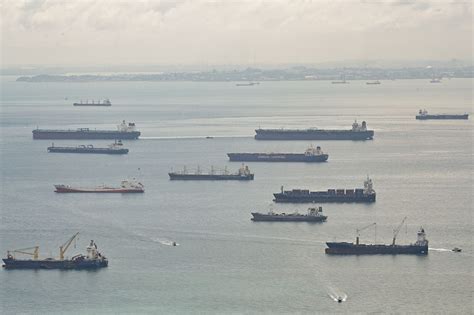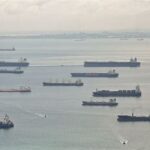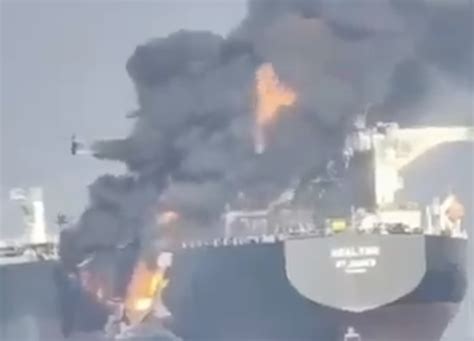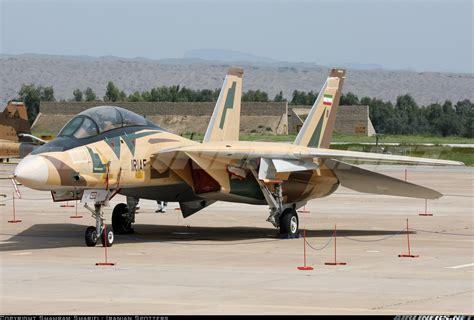
A tanker believed to be part of the “dark fleet,” vessels suspected of illicitly transporting sanctioned Iranian oil, caught fire near the Strait of Hormuz after a collision, raising concerns about maritime safety and sanctions enforcement in the region.
A collision has sparked a fire aboard an oil tanker suspected of involvement in sanctions-busting activity near the Strait of Hormuz, a critical chokepoint for global oil supplies. The incident, reported on Monday, has ignited concerns about maritime safety and the clandestine operations of the so-called “dark fleet,” a network of vessels often used to transport sanctioned Iranian oil while attempting to evade international regulations. The tanker involved is suspected of being part of this fleet, which typically operates with obscured identities and frequently engages in ship-to-ship transfers to mask the origin of the cargo. While details remain limited, the incident highlights the risks associated with these shadowy practices and the potential for environmental and economic disruption in a vital maritime artery. No casualties have been immediately reported, but the extent of the damage to the tanker and the potential for oil spills are still being assessed. The incident has also intensified scrutiny of the effectiveness of sanctions enforcement and the tactics employed by Iran to continue exporting oil despite international restrictions.
Details of the Incident
The collision reportedly occurred early Monday morning near the Strait of Hormuz, a narrow waterway that connects the Persian Gulf to the Gulf of Oman and the Arabian Sea. This strategic location is crucial for global oil trade, with a significant percentage of the world’s oil supply passing through it daily. The exact circumstances of the collision remain unclear, but initial reports suggest that the tanker, suspected of involvement in transporting sanctioned Iranian oil, collided with another vessel. The impact resulted in a fire erupting on board the tanker, prompting immediate concerns about the safety of the crew and the potential for an oil spill.
While the identity of the other vessel involved in the collision has not been officially confirmed, maritime tracking data and industry sources are being scrutinized to determine its role in the incident. The focus remains on the tanker suspected of being part of the “dark fleet” due to the heightened scrutiny surrounding these vessels and their involvement in illicit activities.
The fire aboard the tanker is a significant concern, as it poses a direct threat to the vessel’s structural integrity and the potential for a catastrophic oil spill. Containment and firefighting efforts are likely underway, although the effectiveness of these measures will depend on the extent of the damage and the availability of resources. The incident also raises questions about the safety standards and operational practices of the “dark fleet,” which often operates with minimal oversight and a disregard for international regulations.
The “Dark Fleet” and Sanctions Evasion
The term “dark fleet” refers to a network of aging and often poorly maintained vessels that are used to transport sanctioned oil, primarily from Iran and Venezuela, while attempting to evade detection and international regulations. These vessels typically operate with obscured identities, often changing their names, flags, and ownership to conceal their true origins and destinations. They also frequently engage in ship-to-ship transfers, where oil is transferred from one vessel to another at sea, to further mask the origin of the cargo and avoid detection by authorities.
The use of the “dark fleet” is a key strategy employed by Iran to circumvent international sanctions imposed on its oil exports. These sanctions are intended to limit Iran’s access to funds that could be used to finance its nuclear program and other activities deemed destabilizing by the international community. By using the “dark fleet,” Iran is able to continue exporting oil, albeit at a reduced level, and generate revenue that it would otherwise be unable to access.
The operation of the “dark fleet” poses a number of challenges for sanctions enforcement. The vessels are often difficult to track and identify, and the ship-to-ship transfers make it even harder to determine the origin and destination of the oil. Additionally, the “dark fleet” often operates in areas with limited surveillance and enforcement capabilities, making it easier for them to evade detection.
The United States and other countries have taken steps to counter the “dark fleet,” including imposing sanctions on individuals and entities involved in its operation. However, the effectiveness of these measures has been limited, and the “dark fleet” continues to operate, albeit with increased risks and challenges.
Impact on Oil Markets and Geopolitical Tensions
The incident involving the tanker near the Strait of Hormuz has the potential to impact global oil markets and further escalate geopolitical tensions in the region. The Strait of Hormuz is a critical chokepoint for oil supplies, with a significant percentage of the world’s oil passing through it daily. Any disruption to traffic in the strait could lead to a spike in oil prices and increased volatility in the market.
The incident also underscores the risks associated with the “dark fleet” and its involvement in sanctions evasion. The operation of these vessels not only undermines the effectiveness of sanctions but also poses a threat to maritime safety and the environment. The potential for oil spills and other accidents is heightened by the age and poor maintenance of the vessels, as well as the lack of oversight and regulation.
The incident is likely to further strain relations between Iran and the United States, as well as other countries that are seeking to enforce sanctions on Iran. The United States has repeatedly warned Iran about the consequences of its sanctions evasion activities, and the incident could lead to increased pressure on Iran to comply with international regulations.
The incident also highlights the need for greater international cooperation to address the challenges posed by the “dark fleet.” This includes enhanced surveillance and enforcement efforts, as well as measures to prevent ship-to-ship transfers and other tactics used to evade sanctions.
Historical Context and Previous Incidents
The use of “dark fleets” and other methods of sanctions evasion is not a new phenomenon. In the past, countries facing sanctions have often resorted to similar tactics to circumvent restrictions on their trade and financial activities. However, the scale and sophistication of the “dark fleet” operating in the Persian Gulf region have grown in recent years, reflecting the increasing pressure on Iran to comply with international sanctions.
There have been several previous incidents involving tankers suspected of involvement in sanctions evasion, including collisions, fires, and detentions. These incidents have underscored the risks associated with these activities and the need for greater vigilance and enforcement.
In 2019, several tankers were attacked in the Gulf of Oman, raising tensions between Iran and the United States. The United States blamed Iran for the attacks, while Iran denied any involvement. The incidents led to increased calls for greater maritime security in the region.
In 2021, a tanker suspected of carrying sanctioned Iranian oil was detained by Indonesian authorities. The vessel was accused of violating Indonesian law by transferring oil to another vessel without permission. The incident highlighted the challenges of enforcing sanctions against Iran and the need for greater international cooperation.
Expert Analysis and Commentary
Maritime security experts have expressed concern about the increasing use of the “dark fleet” and the risks it poses to maritime safety and the environment. They have called for greater international cooperation to address the challenges posed by these vessels and to prevent them from undermining sanctions enforcement.
“The ‘dark fleet’ is a growing problem that needs to be addressed urgently,” said a maritime security analyst. “These vessels are often poorly maintained and operated, and they pose a significant threat to maritime safety and the environment. We need to increase surveillance and enforcement efforts to prevent them from operating with impunity.”
“The incident involving the tanker near the Strait of Hormuz is a wake-up call,” said another expert. “It underscores the risks associated with sanctions evasion and the need for greater international cooperation to address this challenge. We need to work together to prevent these vessels from operating and to hold those involved in sanctions evasion accountable.”
Ongoing Investigations and Future Implications
Investigations into the collision involving the tanker near the Strait of Hormuz are ongoing. Authorities are working to determine the cause of the collision and to assess the extent of the damage to the vessel and the potential for oil spills.
The incident is likely to have several implications for the region and for the enforcement of sanctions against Iran. It could lead to increased pressure on Iran to comply with international regulations and to curb its sanctions evasion activities. It could also lead to greater international cooperation to address the challenges posed by the “dark fleet.”
The incident also underscores the need for greater vigilance and enforcement in the Strait of Hormuz and other critical maritime chokepoints. The potential for accidents and disruptions in these areas is high, and it is essential to take steps to mitigate these risks.
Potential Environmental Impact
The potential environmental impact of the fire aboard the tanker is a major concern. A significant oil spill could have devastating consequences for marine life and coastal ecosystems. The Strait of Hormuz is a sensitive environmental area, and any pollution could have long-lasting effects.
Containment and cleanup efforts are likely to be hampered by the location of the incident and the ongoing security concerns in the region. The response will require a coordinated effort involving multiple countries and organizations.
The incident also highlights the need for greater environmental safeguards in the maritime industry. The “dark fleet” often operates with minimal regard for environmental regulations, and this poses a significant risk to the marine environment.
Economic Ramifications
Economically, the immediate impact could be a temporary rise in oil prices due to uncertainty and perceived supply risks. The long-term ramifications depend on the extent of the damage, potential sanctions adjustments, and the overall geopolitical climate. Insurers and shipping companies operating in the region will likely reassess their risk profiles, potentially leading to higher insurance premiums and stricter compliance procedures.
The incident may also accelerate the trend of diversifying energy sources and supply routes as countries seek to reduce their dependence on oil and mitigate the risks associated with geopolitical instability in the region.
The Role of International Law and Maritime Regulations
The incident raises important questions about the role of international law and maritime regulations in addressing the challenges posed by the “dark fleet.” These vessels often operate in a legal gray area, exploiting loopholes and ambiguities in international regulations to evade sanctions.
Strengthening international law and maritime regulations is essential to prevent the “dark fleet” from operating with impunity. This includes measures to enhance transparency and accountability in the shipping industry, as well as to improve surveillance and enforcement efforts.
The incident also highlights the need for greater cooperation between countries to enforce international law and maritime regulations. This includes sharing information and intelligence, as well as coordinating enforcement actions.
Technological Advances and Surveillance
Technological advancements play a crucial role in monitoring and tracking vessels, including those suspected of being part of the “dark fleet.” Satellite imagery, advanced radar systems, and data analytics are increasingly used to identify and track vessels engaged in illicit activities.
These technologies can provide valuable insights into the movements and activities of the “dark fleet,” helping to identify patterns and trends that can be used to disrupt their operations. However, the “dark fleet” is also adapting to these technologies, using countermeasures to evade detection.
The ongoing technological arms race between those seeking to enforce sanctions and those seeking to evade them is likely to continue, with both sides developing new and innovative ways to outsmart each other.
The Future of Sanctions Enforcement
The incident involving the tanker near the Strait of Hormuz underscores the challenges of enforcing sanctions in a globalized world. The “dark fleet” is just one example of the many tactics that countries and individuals use to evade sanctions.
The future of sanctions enforcement will likely depend on several factors, including the effectiveness of international cooperation, the development of new technologies, and the willingness of countries to take strong action against those who violate sanctions.
Sanctions are a powerful tool, but they are not a panacea. They need to be used in conjunction with other measures, such as diplomacy and engagement, to achieve their intended objectives.
Conclusion
The collision and fire aboard the tanker suspected of involvement in sanctions-busting activities near the Strait of Hormuz is a stark reminder of the complex challenges facing the international community in addressing sanctions evasion and maintaining maritime safety. The incident highlights the risks associated with the “dark fleet” and its potential to disrupt global oil markets, escalate geopolitical tensions, and damage the environment. A coordinated and multi-faceted approach, involving enhanced international cooperation, technological innovation, and strengthened legal frameworks, is essential to effectively address these challenges and ensure the stability and security of this vital maritime region. The long-term consequences of this incident will depend on the outcomes of ongoing investigations, the responses of international actors, and the broader geopolitical dynamics in the Middle East.
Frequently Asked Questions (FAQ)
1. What is the “dark fleet” of oil tankers?
The “dark fleet” refers to a network of aging and often poorly maintained oil tankers used to transport sanctioned oil, primarily from Iran and Venezuela, while attempting to evade international sanctions and detection. These vessels frequently obscure their identities by changing names, flags, and ownership, and often engage in ship-to-ship transfers to mask the origin of their cargo.
2. Why is the Strait of Hormuz so important?
The Strait of Hormuz is a critical strategic waterway connecting the Persian Gulf to the Gulf of Oman and the Arabian Sea. A significant percentage of the world’s oil supply passes through this narrow chokepoint daily, making it vital for global energy security. Any disruption to traffic in the Strait could lead to a spike in oil prices and increased volatility in the market.
3. What are the potential environmental consequences of this tanker fire?
A major concern is the potential for a significant oil spill, which could have devastating consequences for marine life and coastal ecosystems in the sensitive environmental area of the Strait of Hormuz. Containment and cleanup efforts could be hampered by the location of the incident and ongoing security concerns in the region.
4. What measures are being taken to counter the “dark fleet”?
The United States and other countries have imposed sanctions on individuals and entities involved in the operation of the “dark fleet.” Enhanced surveillance and enforcement efforts, as well as measures to prevent ship-to-ship transfers, are also being implemented. Technological advancements, such as satellite imagery and data analytics, are being used to track and identify these vessels.
5. How might this incident affect global oil markets and geopolitical tensions?
The incident has the potential to impact global oil markets by causing a temporary rise in oil prices due to uncertainty and perceived supply risks. It could also further escalate geopolitical tensions in the region, particularly between Iran and the United States, and increase scrutiny of sanctions enforcement.









